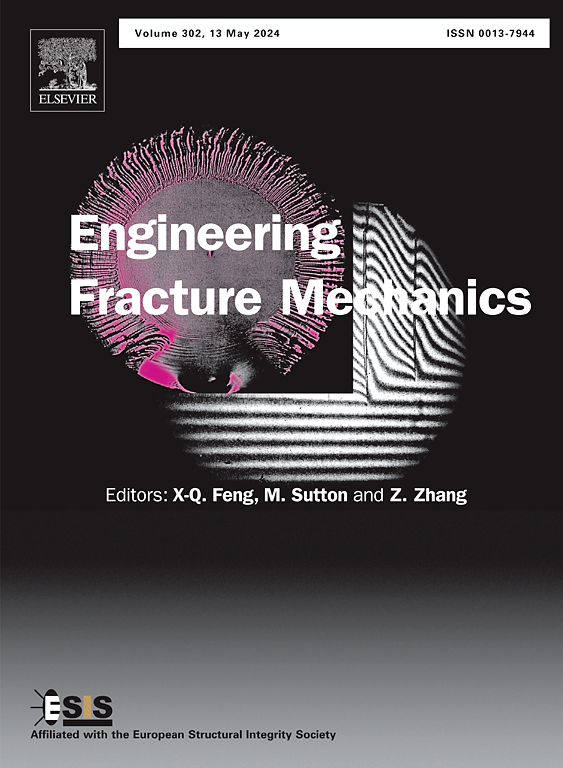各向异性特征断裂法,通过代表性裂缝要素框架考虑木结构中的混合断裂模式
IF 4.7
2区 工程技术
Q1 MECHANICS
引用次数: 0
摘要
对木材各向异性断裂现象进行有限元分析是一项具有挑战性的任务,尤其是在处理复杂的加载情况和特定模式行为时。以能量为动机的方法(如特征断裂法)的吸引力在于,它们可以在不事先了解裂纹路径的情况下模拟断裂。前景广阔的特征断裂法已在各向同性材料中显示出良好的数值性能,本文将展示其在各向异性材料中的应用。木材就是这样一种各向异性材料,在本手稿中,弹性和断裂演化的方向依赖性都被纳入了特征断裂方法。此外,特征断裂法还与代表裂缝元素(RCE)结合使用,从而可以准确模拟物理裂缝变形。在有限元框架中系统地推导并实施了控制方程。通过具有代表性的数值示例,展示了相场法相对于其他方法的一些优势。这项工作的另一个亮点是可以提供平行于纤维方向和垂直于纤维方向的能量释放率的实际比率,从而实现物理上精确的裂纹模式。此外,由于确定裂纹运动学所需的未知数可以在材料层面上进行分析求解,从而减少了计算工作量,这一特点也使得并行化成为可能。本文章由计算机程序翻译,如有差异,请以英文原文为准。
An anisotropic eigenfracture approach accounting for mixed fracture modes in wooden structures by the Representative Crack Element framework
Finite Element analysis of anisotropic fracture phenomena in wood is a challenging task, particularly when dealing with intricate loading scenarios and mode-specific behavior. The appeal of energetically motivated approaches, such as the eigenfracture method, is that they enable simulation of fracture without prior knowledge of the crack path. The promising eigenfracture method has shown good numerical performance for isotropic materials, and this contribution showcases its application to anisotropic materials. Wood is one such anisotropic material and in this manuscript, the directional dependence of both elasticity and fracture evolution are incorporated into the eigenfracture approach. Further, the eigenfracture approach is used in conjunction with Representative Crack Elements (RCE), which permit accurate modeling of physical crack deformations. The governing equations are systematically derived and implemented into the Finite Element framework. By representative numerical examples, some advantages over the alternative phase-field method are demonstrated. Another highlight of this work is that it is possible to provide a realistic ratio of the energy release rates parallel to and perpendicular to the fiber direction in order to achieve physically accurate crack patterns. Additionally, the calculation effort is reduced, because the unknowns required to determine the crack kinematics can be solved analytically at the material level, a feature that also enables parallelization.
求助全文
通过发布文献求助,成功后即可免费获取论文全文。
去求助
来源期刊
CiteScore
8.70
自引率
13.00%
发文量
606
审稿时长
74 days
期刊介绍:
EFM covers a broad range of topics in fracture mechanics to be of interest and use to both researchers and practitioners. Contributions are welcome which address the fracture behavior of conventional engineering material systems as well as newly emerging material systems. Contributions on developments in the areas of mechanics and materials science strongly related to fracture mechanics are also welcome. Papers on fatigue are welcome if they treat the fatigue process using the methods of fracture mechanics.

 求助内容:
求助内容: 应助结果提醒方式:
应助结果提醒方式:


